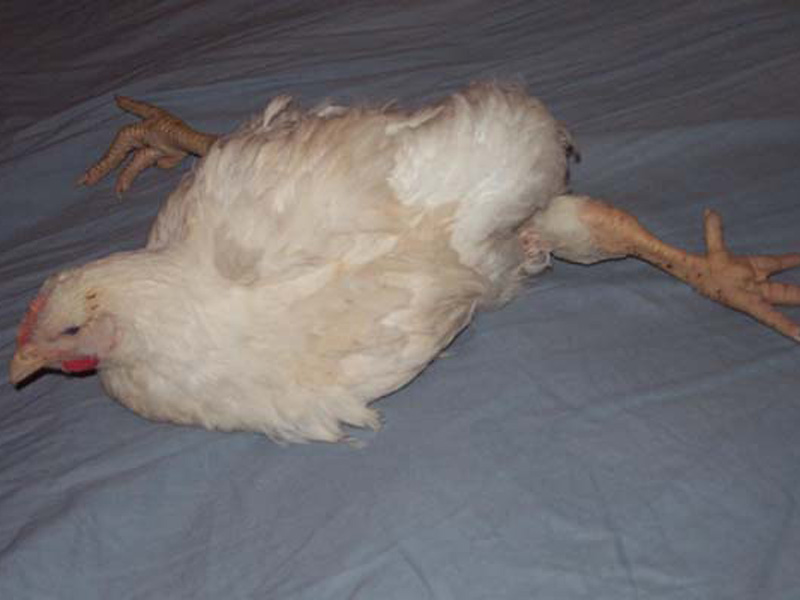Chicks are prone to different kinds of diseases. Most chick diseases occur in the first weeks of the chick’s life, when the chick is a newborn. Therefore, it is necessary to know which are the most frequent infections, such as being able to eliminate pathogens and treat baby chickens to avoid their death.
From the first day, until after week four, it is the most prone period for there to be some transmission of infection in the chicks. That is why we invite you to know the main diseases of baby chickens and how to treat them.
Main chick diseases

Like any newborn animal, chicks are more likely to get sick because they do not have a fully developed immune system and various organs are not yet fully used to activities. This causes baby chickens to get sick frequently.
The main infections that chicks get sick from are:
1. Avian infectious bronchitis
It is caused by the virus, which can cause difficulty in breathing and secretions in the eyes and appear watery.
Treatment:
There is no method that can cure the chicken when the disease occurs. So it will always be better to prevent this infection from appearing through vaccines, which will create immunity to this disease and can be applied from the day they are born.
2. Avian plague or Newcastle
It is one of the diseases in chickens that kills them quickly and in large numbers, caused by the paramyxovirus virus. It begins with respiratory problems such as panting and coughing, then affects the nervous system, causing the chick to place its head between its legs, begin to move its head in circles, and walk backward.
Treatment:
As in most diseases, once infected there is no treatment to save the chick, so it is recommended to prevent infection with B1 vaccines and to apply their booster during the development of the chicken to prevent it from getting sick from Newcastle.
3. Avian coryza
Infectious coryza is a disease that is caused by the bacteria Haemophilus gallinarum. It causes inflammation in the eyes, discharge from the nose and eyes, and may turn cheesy.
Treatment:
It is advisable to prevent bacterial infection by applying vaccines such as tetracycline, quinolones, and streptomycin. If you see a chick that has symptoms of a disease, it should be separated from the hen house immediately.
4. Avian encephalomyelitis
It is a disease of baby chickens caused by a viral infection that affects birds in their first weeks of life, the symptoms observed are a hesitant walk and sometimes total or partial paralysis of the body.
Treatment:
Unfortunately, this infection in baby chickens has no cure, it is recommended that the bird be slaughtered and buried or burned to prevent the virus from spreading to other tender chickens.
5. Gumboro
Also called Bursitis, it is a viral disease that attacks baby chickens in their first weeks of life. Although it can also be damaging to young and mature birds. The first symptoms are related to the respiratory system, being able to hear panting and coughing, then trembling is observed throughout its body and very little mobility. In addition, the chick’s cloaca swells almost twice its normal size.
Treatment:
There is no known treatment that completely eliminates the Gumboro virus in chicks, its only way is to prevent contagion. This can be done by vaccinations against the disease in your week of birth. Another alternative is to vaccinate the mothers so that immunity is transmitted to their chicks through the egg.
6. Avian influenza
Known as avian plague, it is a highly contagious viral disease, which can kill large numbers of birds. Fortunately, avian influenza only affects domestic animals and not humans.
Its symptoms are depression of the bird, drinking excess water but not consuming food, suffering from bright green diarrhea, has inflammation in ridges and chins. This disease causes up to 100% of deaths in infected baby chickens and is very easily confused with Newcastle disease or fowl cholera.
Treatment:
The disease can be prevented by applying oil-inactivated vaccines to newborn chicks. In addition, many poultry farmers use amantadine hydrochloride treatments, this is one of the most effective drugs to avoid the incidence of avian influence.
7. Chick diarrhea
Diarrhea is more than a disease, it is a symptom of an infection. Being able to be caused by various pathogens, diarrhea generally affects chickens under 2 months of age. It is characterized because the diarrhea is greenish or white in color, and may or may not contain blood.
Treatment:
Generally, when a chicken in its first weeks has diarrhea, it is treated with antibiotics, either by a vaccine or by dissolving in water. Depending on the color it can be different diseases:
- Bloody diarrhea.
- Stool with green diarrhea.
- White diarrhea
See Also:
- Bakit Namamatay ang mga Sisiw sa Loob ng Itlog
- Why Do Chicks Die Inside the Egg
- Bakit Nangingitlog ang Manok sa Labas ng Pugad
- Why Hens Lay Eggs Outside their Nest
- White Leghorn chicken breed and egg production guide